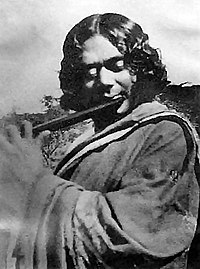|
Vikidia currently has 4,625 articles. Improve it! |
|
Join Vikidia: create your account now and improve it! |
Kazi Nazrul Islam
Kazi Nazrul Islam (25 May 1899 - 29 August 1966; 11 Jaish 1307 - 12 Bhadra 1383 BS) was a Bengali poet born in Radha Bengal and later the national poet of Bangladesh. He was one of the leading Bengali poets, novelists, playwrights, musicians and philosophers of the twentieth century who was best known for his pioneering role in Bengali poetry as well as for his progressive impetus. He is one of the best personalities in the field of Bengali literature, society and culture and he was one of the leading figures of Bengali Manisha. His poems and songs are equally admired in West Bengal and Bangladesh. He has been called a rebellious poet because of his rebellious attitude in his poetry. The main theme of his poems was the vocal protest against human oppression and social injustice and exploitation.
The dignity and importance of Kazi Nazrul Islam in the twentieth century Bengali mind is immense. As a poet, writer, musician, journalist, editor, politician and soldier, Nazrul was always vocal against injustice and injustice. This attitude is reflected in his poems and songs. His entry into the hands of Agniveena, his manifestation like a comet. As a rebel in writing, so in life - so the "rebel poet", his birth and death anniversaries are celebrated every year in Bengal with special dignity.
Nazrul was born into a poor Muslim family. His primary education was religious. He also worked as a respected muezzin in a local mosque. As a teenager, he went on to work with various theater groups, gaining a thorough knowledge of poetry, drama and literature. After serving in the Indian Army for some time, he chose journalism as his profession. At that time he was living in Calcutta. During this time he embarked on a direct struggle against the British Raj. Publishes poems like Rebel and Broken Song; Comet-like periodicals. After being imprisoned, he wrote the statement of the political prisoner. In all these literary works, the opposition to imperialism was obvious. He had a special relationship with the pious Muslim community and the neglected Indian people. His literary work is dominated by love, liberation and rebellion. He also wrote against religious sexism. Although he wrote short stories, novels and plays, he is better known as a poet. He gave birth to a new genre in Bengali poetry. This is Islamic music or ghazal, in addition to which he also composed many excellent Shyama music and Hindu devotional songs. Nazrul composed about 3000 songs and composed most of them which are now known as Nazrul Sangeet or "Nazrul Geeti" and are especially popular.
In middle age he contracted Pixus disease. As a result, he had to stay away from literary work till his death. At the same time he lost his mental balance. He came to Dhaka with his family in 1972 at the invitation of the Bangladesh government. At that time he was given the nationality of Bangladesh. This is where he died.[1]
